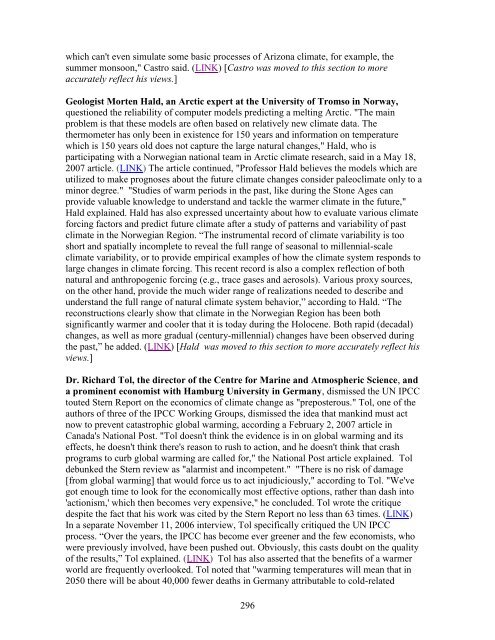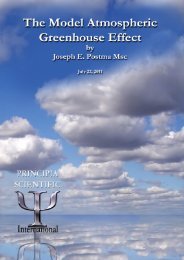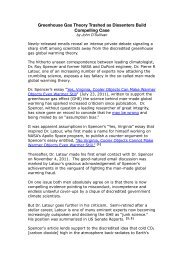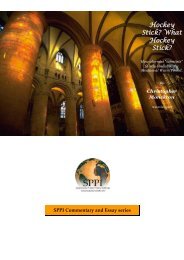Than 1000 International Scientists Dissent Over Man-Made Global ...
Than 1000 International Scientists Dissent Over Man-Made Global ...
Than 1000 International Scientists Dissent Over Man-Made Global ...
Create successful ePaper yourself
Turn your PDF publications into a flip-book with our unique Google optimized e-Paper software.
which can't even simulate some basic processes of Arizona climate, for example, the<br />
summer monsoon," Castro said. (LINK) [Castro was moved to this section to more<br />
accurately reflect his views.]<br />
Geologist Morten Hald, an Arctic expert at the University of Tromso in Norway,<br />
questioned the reliability of computer models predicting a melting Arctic. "The main<br />
problem is that these models are often based on relatively new climate data. The<br />
thermometer has only been in existence for 150 years and information on temperature<br />
which is 150 years old does not capture the large natural changes," Hald, who is<br />
participating with a Norwegian national team in Arctic climate research, said in a May 18,<br />
2007 article. (LINK) The article continued, "Professor Hald believes the models which are<br />
utilized to make prognoses about the future climate changes consider paleoclimate only to a<br />
minor degree." "Studies of warm periods in the past, like during the Stone Ages can<br />
provide valuable knowledge to understand and tackle the warmer climate in the future,"<br />
Hald explained. Hald has also expressed uncertainty about how to evaluate various climate<br />
forcing factors and predict future climate after a study of patterns and variability of past<br />
climate in the Norwegian Region. ―The instrumental record of climate variability is too<br />
short and spatially incomplete to reveal the full range of seasonal to millennial-scale<br />
climate variability, or to provide empirical examples of how the climate system responds to<br />
large changes in climate forcing. This recent record is also a complex reflection of both<br />
natural and anthropogenic forcing (e.g., trace gases and aerosols). Various proxy sources,<br />
on the other hand, provide the much wider range of realizations needed to describe and<br />
understand the full range of natural climate system behavior,‖ according to Hald. ―The<br />
reconstructions clearly show that climate in the Norwegian Region has been both<br />
significantly warmer and cooler that it is today during the Holocene. Both rapid (decadal)<br />
changes, as well as more gradual (century-millennial) changes have been observed during<br />
the past,‖ he added. (LINK) [Hald was moved to this section to more accurately reflect his<br />
views.]<br />
Dr. Richard Tol, the director of the Centre for Marine and Atmospheric Science, and<br />
a prominent economist with Hamburg University in Germany, dismissed the UN IPCC<br />
touted Stern Report on the economics of climate change as "preposterous." Tol, one of the<br />
authors of three of the IPCC Working Groups, dismissed the idea that mankind must act<br />
now to prevent catastrophic global warming, according a February 2, 2007 article in<br />
Canada's National Post. "Tol doesn't think the evidence is in on global warming and its<br />
effects, he doesn't think there's reason to rush to action, and he doesn't think that crash<br />
programs to curb global warming are called for," the National Post article explained. Tol<br />
debunked the Stern review as "alarmist and incompetent." "There is no risk of damage<br />
[from global warming] that would force us to act injudiciously," according to Tol. "We've<br />
got enough time to look for the economically most effective options, rather than dash into<br />
'actionism,' which then becomes very expensive," he concluded. Tol wrote the critique<br />
despite the fact that his work was cited by the Stern Report no less than 63 times. (LINK)<br />
In a separate November 11, 2006 interview, Tol specifically critiqued the UN IPCC<br />
process. ―<strong>Over</strong> the years, the IPCC has become ever greener and the few economists, who<br />
were previously involved, have been pushed out. Obviously, this casts doubt on the quality<br />
of the results,‖ Tol explained. (LINK) Tol has also asserted that the benefits of a warmer<br />
world are frequently overlooked. Tol noted that "warming temperatures will mean that in<br />
2050 there will be about 40,000 fewer deaths in Germany attributable to cold-related<br />
296





